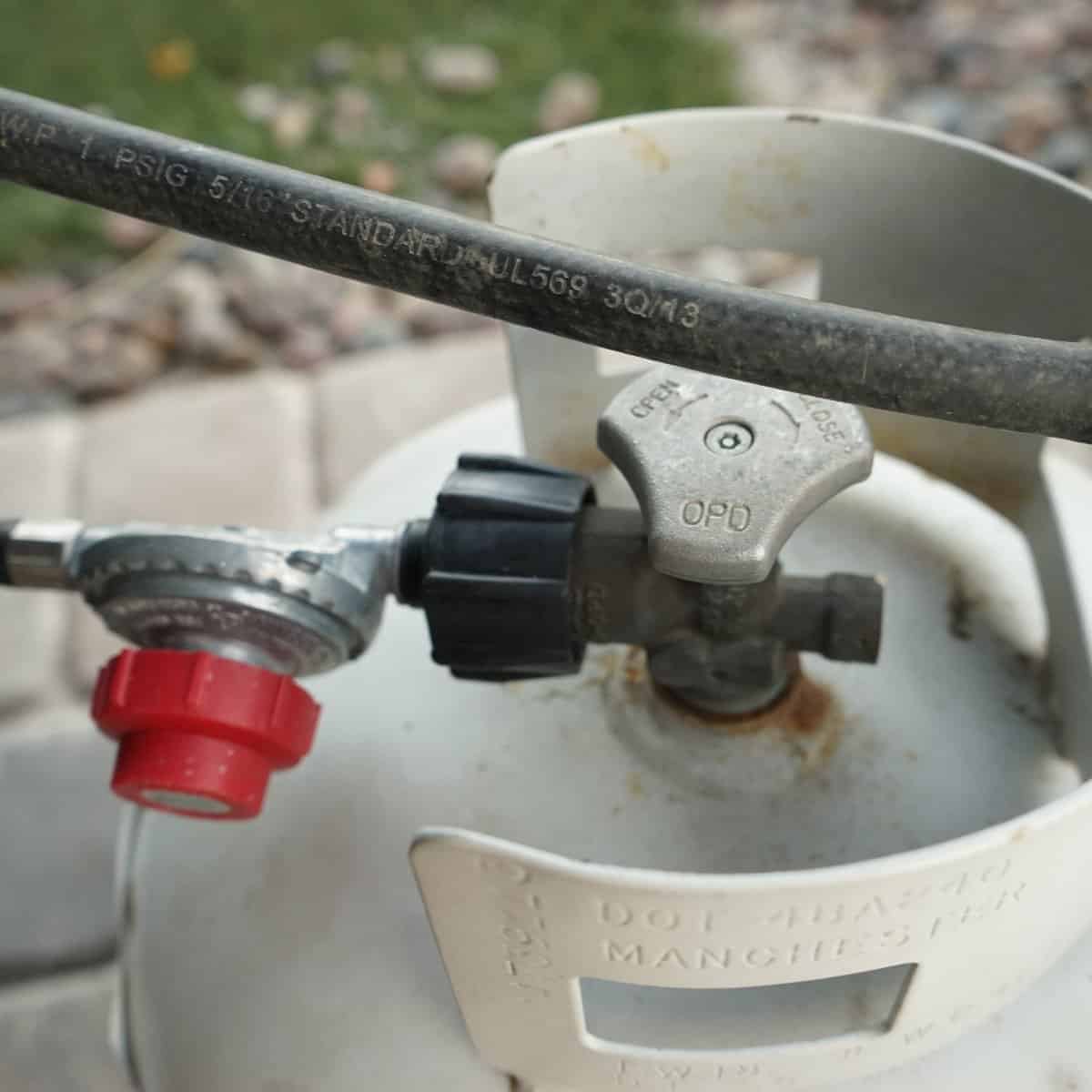Propane: Why Use It For Cooking
Propane is a three-carbon alkane with the molecular formula, normally a gas, but compressible to a transportable liquid.
Regarding cooking, propane is a great choice for many reasons.
- First, it’s very affordable.
- Second, it’s easy to find and purchase.
- Third, it’s a very efficient fuel source. And fourth, it produces little to no emissions when burned.
So, if you’re looking for an affordable, efficient, and clean-burning fuel source for your cooking needs, propane is a great option to consider.
In this article, I’ll discuss the benefits and drawbacks of using propane as a cooking fuel and whether it’s safe to use indoors. Plus, I’ll share some tips on how to make the most of it.


Check out our new cookbook
Bitemybun's family recipes with complete meal planner and recipe guide.
Try it out for free with Kindle Unlimited:
Read for freeIn this post we'll cover:
- 1 Propane: The Alternative Energy Source for Cooking
- 2 Propane Gas Cooktops and Ovens – The Best Choice for Safe and Efficient Cooking
- 3 Propane vs Natural Gas: Which is the Better Choice for Cooking?
- 4 Propane vs Electric: Which is the Better Choice for Cooking?
- 5 Are propane grills more expensive?
- 6 Conclusion
Propane: The Alternative Energy Source for Cooking
Propane is a natural gas that is commonly used as an energy source for cooking. It is a byproduct of natural gas processing and petroleum refining. Propane is stored in a liquid form and is converted to gas when it is released from its container. It contains approximately 2500 BTUs per cubic foot, making it an efficient and affordable alternative to electric power.
Propane vs. Natural Gas
Propane and natural gas are both used as energy sources for cooking, but there are some differences between the two. Propane is stored in a liquid form, while natural gas is supplied directly from a gas line. Propane is heavier than air and will sink to the lowest point, while natural gas is lighter than air and will rise to the upper level. Propane is classified as a liquefied petroleum gas, while natural gas is classified as a fossil fuel. Propane is considered a more affordable alternative to natural gas, and it is widely available in areas where natural gas is not supplied.
Propane and Safety
Propane is an extremely safe energy source for cooking when used correctly. It has a lower flammability rating than gasoline, diesel fuel, and ethanol. Propane is also non-toxic and will not contaminate water or soil. However, it is important to follow proper safety measures when using propane, such as keeping the area well-ventilated and never leaving a propane appliance unattended.
Propane and Convenience
Propane offers several features that make it a convenient choice for cooking. It is available in a variety of sizes, from small tanks for grilling to larger tanks for home heating. Propane can be delivered directly to your home or business, making it easy to keep your propane tank full. Propane appliances offer precise temperature control, allowing chefs to create optimum performance in the kitchen. Propane is also a popular choice for outdoor cooking, as it can be used to power grills, stoves, and other appliances.
Propane and Performance
Propane offers unique performance benefits that make it a popular choice for chefs and homeowners. Propane appliances offer direct heat, allowing for precise temperature control and even cooking. Propane also offers a cool flame, leaving the kitchen less hot and more comfortable to work in. Propane appliances are also known for their high BTU output, making them a powerful energy source for cooking.
Propane Gas Cooktops and Ovens – The Best Choice for Safe and Efficient Cooking
Propane gas is a popular fuel choice for cooking in many parts of the country. Here are some of the benefits of using propane gas for your cooktops and ovens:
- Propane gas produces an excellent amount of heat, making it ideal for cooking and heating.
- Propane gas is a clean-burning fuel, producing fewer pollutants and emissions compared to other fuels.
- Propane gas is the cleanest burning fossil fuel, resulting in minimal wasted fuel and unused combustion.
- Propane gas is the safest fuel for cooking, with minimal impact on the environment.
- Propane gas is an efficient resource, requiring less fuel to produce the same amount of heat compared to other fuels.
- Propane gas is a cost-effective fuel, typically costing less per month to run than electric-powered units.
Positive Impact on Cooking
Propane gas cooktops and ovens offer several advantages over their electric counterparts. Here are some of the ways propane gas can positively impact your cooking:
- Propane gas heats up quickly and efficiently, allowing you to start preparing your food faster.
- Propane gas provides a hotter and more consistent heat source, making it easier to handle and cook food.
- Propane gas cooktops and ovens can handle wet and hot environments better than electric units.
- Propane gas produces a dry heat, making it ideal for baking and roasting.
- Propane gas cooktops and ovens are excellent for producing desired results in cooking, such as searing meat or caramelizing sugar.
Safety and Environmental Impact
Propane gas is a safe and environmentally friendly fuel choice for cooking. Here are some of the safety and environmental benefits of using propane gas:
- Propane gas is a clean-burning fuel, producing fewer pollutants and emissions compared to other fuels.
- Propane gas is the cleanest burning fossil fuel, resulting in minimal wasted fuel and unused combustion.
- Propane gas is the safest fuel for cooking, with minimal impact on the environment.
- Propane gas has development mechanisms and protocols in place to ensure safe handling and use.
Cost Comparison
Propane gas is a cost-effective fuel choice for cooking. Here is a cost comparison between propane gas and electricity:
- Propane gas heaters cost an average of 30 percent less per month to run than electric-powered heaters.
- Propane gas dryers can save up to 50 percent on operational costs compared to their electric counterparts.
- Propane gas cooktops and ovens can save up to 30 percent on operational costs compared to their electric counterparts.
- Propane gas produces fewer carbon dioxide emissions than electricity, resulting in a smaller carbon footprint.
Propane vs Natural Gas: Which is the Better Choice for Cooking?
Natural gas is a fossil fuel that is composed mainly of methane and is typically found deep beneath the ground. It is classified as a non-renewable energy source and is considered to be a cleaner-burning fuel than other fossil fuels like coal and oil. Natural gas is usually delivered directly to homes and businesses through pipelines.
What are the Differences Between Propane and Natural Gas?
There are several differences between propane and natural gas that are important to consider when deciding which fuel to use for cooking:
- Propane has a higher energy content than natural gas, which means that it produces more heat per unit of fuel.
- Propane is typically more expensive than natural gas, both in terms of the cost of the fuel itself and the cost of the equipment needed to use it.
- Propane is stored in tanks, which means that it must be delivered to the user. Natural gas is delivered directly through pipelines.
- Propane is considered to be more portable than natural gas, as it can be used outside of the home or kitchen.
- Propane is often preferred by experienced cooks because it allows for more precise temperature control and faster cooking times.
Which is the Better Choice for Cooking?
The choice between propane and natural gas for cooking ultimately comes down to a few critical factors:
- Availability: If natural gas is not available in your area, propane may be the only option.
- Cost: Propane is typically more expensive than natural gas, so if cost is a significant factor, natural gas may be the better choice.
- Convenience: If you prefer the convenience of having fuel delivered directly to your home or business, natural gas may be the better choice.
- Cooking Needs: If you are looking for a fuel that will produce high heat output and allow for precise temperature control, propane may be the better choice.
- Kitchen Structure: If your kitchen is designed to work with natural gas appliances, it may be more difficult and expensive to convert to propane.
Propane vs Electric: Which is the Better Choice for Cooking?
When it comes to cooking, there are two main options: propane and electric. Both have their benefits and drawbacks, so it’s important to consider your needs and preferences before making a decision.
The Benefits of Cooking with Electric
Of course, electric cooking has its own advantages as well:
- Electric stoves and ovens are generally less expensive to purchase and install than propane models.
- Electric cooking is considered safer than propane, as there is no risk of gas leaks or explosions.
- Electric stoves and ovens are easier to clean than propane models, as there are no burners or other parts to remove and clean.
Propane vs Electric: Which is Right for You?
When deciding between propane and electric for your cooking needs, there are a few key factors to consider:
- Cost: Propane is generally more expensive than electricity, both in terms of the fuel itself and the cost of installing and maintaining propane appliances.
- Safety: While propane is generally considered safe when used properly, there is always a risk of gas leaks or explosions. Electric cooking eliminates this risk entirely.
- Control: Propane offers more precise temperature control than electric, which can be crucial for preparing delicate dishes. However, electric stoves and ovens offer more consistent heat over time.
- Versatility: Propane is an incredibly versatile fuel source that can be used for a wide range of cooking tasks. However, electric stoves and ovens typically offer more features and options than propane models.
Ultimately, the choice between propane and electric comes down to your individual needs and preferences. If you want a fuel source that offers consistent heat and precise temperature control, propane may be the way to go. If you’re looking for a lower-cost, safer, and easier-to-clean option, electric may be the better choice.
Are propane grills more expensive?
No, not necessarily. In fact, propane grills can be just as affordable as any other type of grill on the market. The key is to shop around and compare prices.
You may even be able to find some great deals on propane grills during sales or promotions.
Is Propane Good for Cooking? Discover the Benefits of Propane Gas
Propane vs Electric: Which is the Best for Cooking?
Propane or Natural Gas: Which is Better for Your Kitchen?
Conclusion
So, is propane good for cooking?
Propane is a great alternative to natural gas and electricity, especially for outdoor cooking. It’s affordable, efficient, and clean-burning, and has minimal impact on the environment. Plus, you can always trust the propane gods!
So, go ahead and enjoy the benefits of propane cooking!
Check out our new cookbook
Bitemybun's family recipes with complete meal planner and recipe guide.
Try it out for free with Kindle Unlimited:
Read for freeJoost Nusselder, the founder of Bite My Bun is a content marketer, dad and loves trying out new food with Japanese food at the heart of his passion, and together with his team he's been creating in-depth blog articles since 2016 to help loyal readers with recipes and cooking tips.
